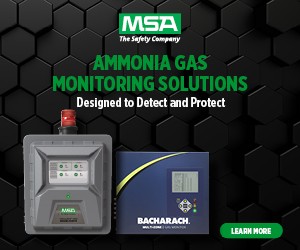IIAR Releases State of the Industry Report
The International Institute of All-Natural Refrigeration published its eighth State of the Industry Report, covering IIAR’s education, training and advocacy efforts as well as a look forward at the trends shaping the industry in the coming year.
Mike McGinnis, the 2024-2025 IIAR Chair of the Board of Directors emphasized that IIAR’s training effort and growing presence in other countries was a focus of the organization in the last year.
“As technology grows and the need for IIAR training and education becomes ever more important, the work we started at IIAR has truly become a global effort championed by organizations in dozens of countries,” said McGinnis.
He added, “We must reinvest on the educational side now for the future of our industry. Driving that additional awareness of IIAR’s scholarship program has really helped us grow our organization and get new engineers into the industrial refrigeration market through education and advocacy.”
McGinnis said that expanding IIAR’s presence in Latin America, where IIAR standards and training are in demand, was an important goal in 2024 and a challenge that IIAR was more than capable of meeting.
He cited a close to 20% increase in participation in IIAR Spanish-language technical training, representing a significant growth from past years. McGinnis also referenced growth in IIAR’s scholarship program, which added four new slots in 2024, bringing the total number of awarded scholarships to 12.
Meanwhile, IIAR said the conflicting dynamic between natural refrigerants and synthetic refrigerants will continue to be an important topic of discussion in 2025 as new considerations, like perfluoroalkyl (PFAS) regulations, are reshaping the way natural refrigerants are considered.
IIAR said in the report that it continued to take a strong position defending natural refrigerants in 2024, and announced the introduction of a Refrigerant Evaluator Tool to help IIAR members and others assess their refrigerant choices. The timing of the release coincides with the Environmental Protection Agency phaseout of high global warming potential refrigerants.
From a regulatory perspective, the American Innovation and Manufacturing (AIM) Act continued to influence everything from IIAR standards creation to regulatory advocacy in 2024 and into the beginning of 2025.
Of the three focus areas laid out by the EPA under the AIM Act, the EPA focused on reducing the leakage from existing refrigeration systems in 2024.
IIAR said this third rule is notable in that it applies to existing refrigeration systems, whereas all other rules and most EPA regulatory actions apply only to new or expansion applications. The Leak Repair regulations will take effect in 2026, forcing all owners with substantial refrigeration systems to act to identify and repair sources of leaks that reduce the charge of refrigerant in their operating systems.
IIAR also announced a soon to be released hydrocarbon standard that IIAR developed to address larger closed-circuit refrigeration systems that use natural hydrocarbons as the refrigerant.
The systems being considered are beyond the size of the presently approved SNAP-listed equipment and systems. IIAR said it hopes that the EPA will consider the standard as a basis for expanding the SNAP approval listings for natural hydrocarbon refrigerants, adding that the standard includes specific design, installation, and startup, as well as inspection, testing, maintenance, decommissioning, and general safety equipment.
The State of the Industry report is an annual report released by IIAR covering the organization’s activities, leadership and trends in the industrial refrigeration industry.
Read the full report here: IIAR State of the Industry Report.











